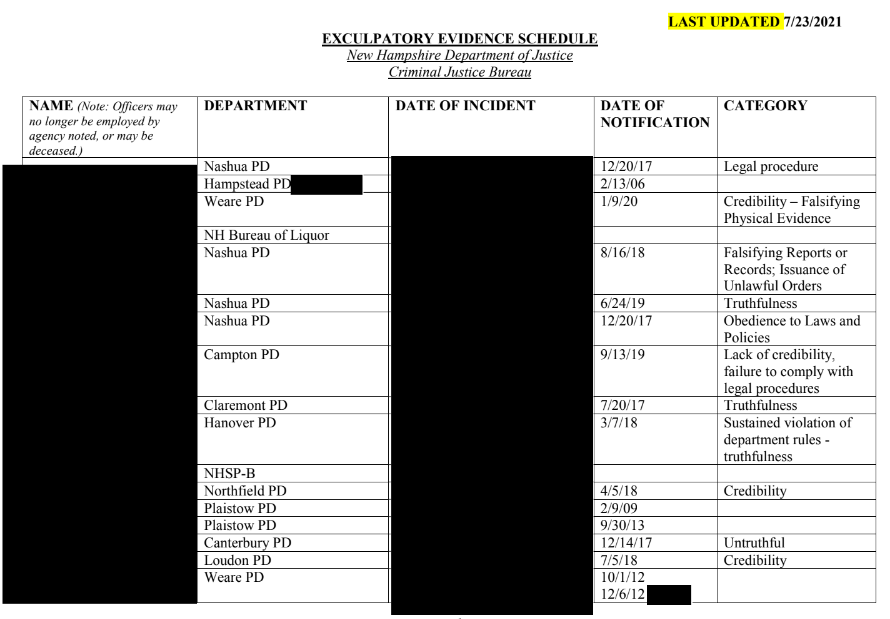By NANCY WEST, InDepthNH.org
CONCORD – Since the Attorney General’s Office began maintaining the Laurie list of dishonest police now known as the Exculpatory Evidence Schedule in March of 2017, a total of 14 redacted names have been confidentially removed, according to Senior Assistant Attorney General Geoffrey Ward.
Ward said no further details will be made public about the sworn law enforcement officers whose names were removed. Prosecutors have always kept the names on the full list confidential and released only the agency where they work, the date they were notified they were on the list and a brief description of the sustained discipline that landed them on the list.
There are more than 280 names on the latest list.
“I can tell you that since its inception on March 21, 2017, fourteen (14) names have been removed from the EES,” Ward said in an email.
When asked why their names were taken off, Ward said: “Any names removed were done so consistent with this Office’s Protocols for Removal from the EES as found in the Attorney General’s April 30, 2018, Additional Guidance Law Enforcement Memorandum. Link: exculpatory-evidence-20180430.pdf (nh.gov).”
That memo was written April 13, 2018, by former Attorney General Gordon MacDonald before he was confirmed Chief Justice of the New Hampshire Supreme Court.
Because sustained finding of misconduct warranting inclusion on the list may be overturned, the memo and protocol permit officers’ names to be removed from EES “with the approval of the attorney general or designee,” MacDonald wrote.
The protocol requires removal when a sustained finding has been overturned. The memo doesn’t say what body would overturn the sustained finding that warranted placement on the list in the first place. The officer must: “Provide a copy of the order or other determination overturning the disciplinary finding,” the memo states. The removal process through the Attorney General’s Office, like so much of the Exculpatory Evidence Schedule, is also confidential.
Before March 2017, all 10 county attorneys maintained the secret lists of dishonest police in their jurisdictions and the Attorney General’s Office kept only a partial statewide list.
Hillsborough County Superior Court Judge Charles Temple ruled in a public records case brought by six news outlets, including InDepthNH.org’s publisher the New Hampshire Center for Public Interest Journalism, and ACLU-NH seeking release of the officers’ names, that the list is a public record, but MacDonald appealed to the state Supreme Court. The Supreme Court also ruled Oct. 30, 2020, that the list is a public document but sent it back to Temple to determine the privacy rights of officers where it stands now.
That public records lawsuit was placed on hold as the legislature considered House Bill 471 that would make the officers’ names public after they were first provided another process to have their names removed from the list through the courts.
What happens next is up in the air as House Bill 471 passed the House and Senate and is awaiting Gov. Chris Sununu’s signature.
With the exception of the New Hampshire Center for Public Interest Journalism, the other news outlets, ACLU-NH, and the Attorney General’s Office reached a compromise that would end the lawsuit if the legislation becomes law, but that decision will be up to Judge Temple.
Andru Volinsky, representing the New Hampshire Center for Public Interest Journalism, argued against the legislative fix.
“Even if the legislation is adopted precisely as drafted, the legislation strikes the wrong balance between the public’s right to know about the functioning of law enforcement officers and departments where serious misconduct allegations exist versus the privacy of individual officers,” Volinsky wrote in his objection.
Any officer on the list could tie up the release of his or her listing by filing litigation that presents a due process claim and prevent release of the listing until that litigation is completed, which could take years, Volinsky said.
“Finally, as if all of the tilting towards the listed officer were not enough, the whole EES (Laurie List) is made completely discretionary,” Volinsky wrote.
See full objection here. https://indepthnh.org/wp-content/uploads/2021/04/Objection-to-Motion-for-Stay-4-13-21-6.pdf
ACLU-NH’s Gilles Bissonnette continues to represent the petitioners that agreed to file the motion to delay, including The Telegraph of Nashua, Newspapers of New England, Inc., Seacoast Newspapers, Inc., Keene Publishing Corporation, and the ACLU-NH. Attorney Gregory Sullivan represents the Union Leader Corp.
They argue in agreement with the Attorney General’s Office: “The proposed statute (House Bill 471) codifies a recommendation from the New Hampshire Commission on Law Enforcement, Accountability, Community, and Transparency (‘LEACT Commission’) that the EES be made public after every officer on the list has been notified that he or she is on the EES and has been informed that he or she has up to 180 days to decide whether to challenge his or her inclusion on the EES.”
The list is maintained to alert prosecutors when their constitutional obligation kicks in to provide criminal defendants with exculpatory evidence, that is evidence favorable to them, including evidence in a police officer’s confidential personnel file that indicates discipline for dishonesty or excessive force.
Defendants who have been denied all evidence favorable to them before trial can later petition for a new trial or to have the charges dropped. In egregious cases, the prosecutor could face discipline for withholding such evidence.
Disclaimer: The New Hampshire Center for public Interest Journalism is the lead plaintiff in the public records lawsuit.





